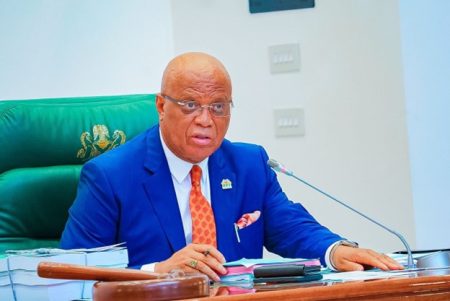
Mkpoikana Udoma
Port Harcourt — The Institute of Chartered Economists of Nigeria, ICEN, says Nigeria economy lost about $22.6 5billion since the closure of Aluminium Smelter Company of Nigeria, ALSCON at Ikot Abasi, Akwa Ibom in 2013.
The economists attributed this to the legal tussle over the ownership between BFIG Group and a Russian company, UC RUSAL, over the firm.
Speaking, South-South Coordinator of ICEN, Mr. Friday Udoh, urged the federal government to prevail on Bureau of Public Enterprise, BPE, to implement the 2012 judgment by the Supreme Court on the plant
Udoh attributed the prolonged shut down of the aluminum smelter plant to the activities of Bureau of Public Enterprise, BPE.
He noted that the BPE under the supervision of National Council for Privatization, NCP had privatized the Aluminum plant in 2007 but one of the bidders went to court to challenge the bid process.
Udoh said the matter was adjudicated at various courts and on July 6, 2012, in the Supreme Court, in favour of the BFIG group but BPE did not comply with the Supreme Court decision and rather, pitched its tent with the Russian firm.
Udoh noted that BPE’s disregard for the apex court judgments would negatively impact on Foreign Direct Investment inflow as no serious investors will want to commit its investment in an economy where rule of law is not adhered to.
“This is just the time the country’s needs investment to create and boost its export capacity and more importantly driving the needed economic growth.
“Already the country has recorded a loss of $16.55billion plus taxes that would have accrued to the host Local government, state and the Federal government bringing the cumulative loss to $22.65billion.
Udoh said that the projected loss was determined from the operational data of the plant prior to shutting down comprising revenue accruable to Ikot Abasi Local Government and Akwa Ibom government totalizing about $6,030,750 (N2, 174,085,375)
According to him, the loss attributed to non production of aluminium for the period stood at about $16.55billion excluding taxes that are payable to the Federal government bringing it to a cumulative estimate of about $22.65 billion
Udoh said that the plant was designed to produce 187 tonnes per year of Aluminium for import substitution while the excess is for export.
He said that allowing such a viable industry aimed at serving the construction industry, transportation, manufacturing sectors to remain shut down since 2013 is a monumental loss to the country.
“We all witnessed and watched very closely the stripping of this asset and subterfuge moved of BPE undermining court pronouncements, again its refusal to evict UC RUSAL to minimize the complete run-down of the plant through the questionable activities of the estranged owner.
“The issue is unimaginable and we think it probably boils down to one school of thought and, that which I entertained, that government has to intervene in ensuring that BPE doe not drag the nation’s judiciary and the country into disrepute.
“We are talking about environment that will allow for investment to sustain economy, create jobs and provide funding for infrastructure improvement and maintenance of the existing ones for sustainable economy.
“We watched the very action UC RUSAL very closely, obviously they have nothing to loose due to its dominant position in smelting and related downstream capacity in the global Aluminium market.
“We should not allow this to happen, else our economy, reputation, and sovereignty are gone. The issue of sustainability is non-negotiable, productivity must be thoroughly addressed for a nation to attain a level of sustainability,” ICEN said.
ICEN further disclosed that only about 15 per cent of the firms privatized by BPE were running while 85 per cent were riddled by non-performance, saying that official of the privatization agency who conducted the transactions may not directly suffer the consequence of their action but average Nigerians and the economy bear the brunt.
The economists noted that there was a need for the Federal Government to call the BPE to order to correct the messages sent by BPE’s activities across the global investment communities.


